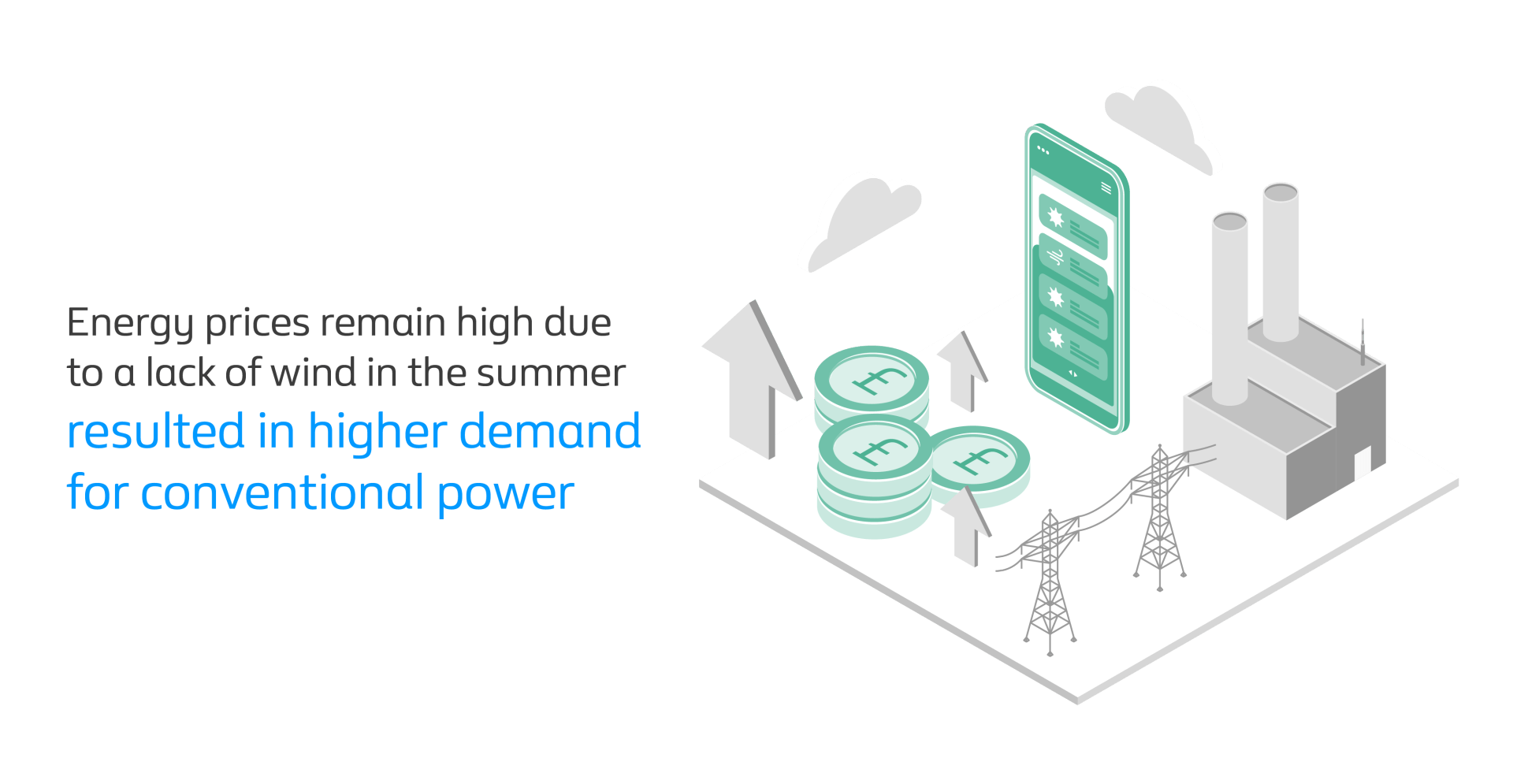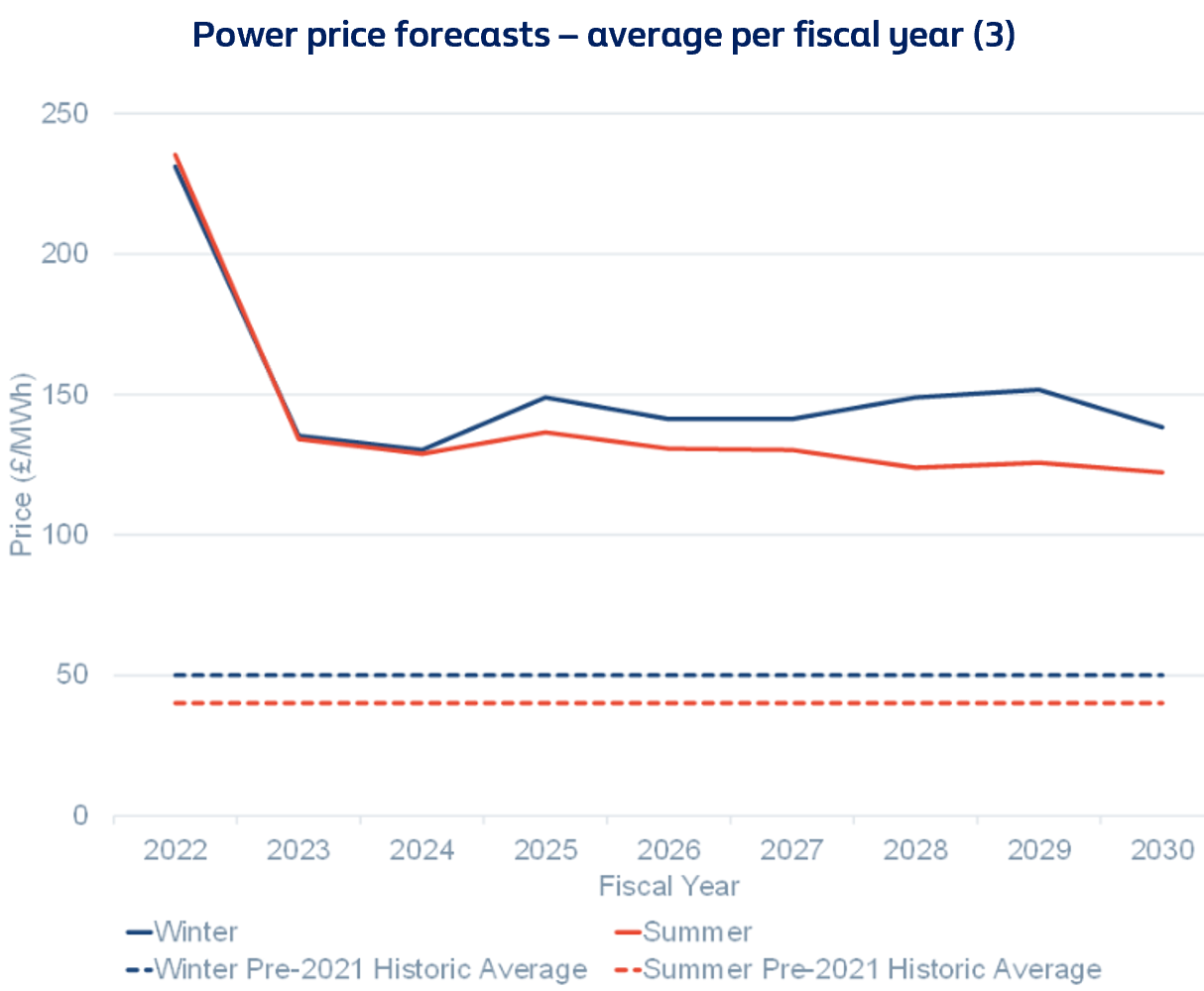Wholesale energy prices have experienced unprecedented levels of volatility since the end of summer 2021, with both day ahead/spot and future contracts surging to all-time highs. In the last couple of months, prices have decreased but still remain high compared to a year ago. This period of high energy prices is expected to continue for the foreseeable future (see next section).
Energy prices have surged for a number of reasons:
- A global increase in gas demand following the ease or end of Covid-related restrictions throughout 2021. After the pandemic, economies across the world started to recover. Asian countries like China saw their imports of Liquified Natural Gas (LNG) increase. This resulted in lower LNG shipments to the UK and Europe.
- On the supply side, the Covid-19 lockdowns pushed some maintenance work from 2020 into 2021 at a time when demand was recovering. In 2021, gas production hit a record low of 363TWh, 47TWh below the previous record low in 2013. Low production was the result of an extensive summer maintenance schedule which saw shutdowns at several major terminals, as well as the Forties Pipeline System which serves a significant proportion of UK gas and oil production.
- A lack of wind in the summer resulted in higher demand for conventional power.
- European gas storage in 2021 and Q1’22 remained far below previous years and it’s unclear how these are going to be replenished in the summer given the concerns around supply including the potential suspension of Russian gas flows due to sanctions.
- The 1,234km offshore Nord Stream 2 gas pipeline, which was designed to double the flow of gas between Russia and Germany (and by extension the rest of Europe) has been abandoned following the invasion of Ukraine.
- Gas storage in the UK is extremely minimal with capacity at less than 2% of the UK’s annual demand, compared with 22% for other European countries.
- Whilst the UK is not heavily reliant on gas coming from Russia, it sources almost half it’s gas supply from Europe. Hence, wholesale gas and power prices in the UK are now subject to knock-on-effects from the conflict in Ukraine.


Against this backdrop, many organisations may struggle to define how to achieve their net zero ambitions. A lack of clarity on where to decarbonise, limited understanding of their energy usage, or financial constraints can all make it difficult to know how to balance the demands of planet and profit. But companies that fail to progress their goals may face growing pressure from stakeholders and erosion of their brand’s value.
The most successful, sustainable organisations search for a balance between economic and environmental responsibility. They know that they cannot focus exclusively on rising energy costs without also considering their environmental impact – and they know that prioritising environmental concerns over financial performance would leave them without a viable business model.

Why are energy prices not decreasing as a result of the fall in wholesale costs?
Over the past two months, wholesale energy prices in the UK has declined, with rates in the day ahead market falling particularly sharply.
This is due to the UK becoming a major transit point for gas to flow into Europe. More LNG has been arriving at facilities in the UK which is then exported to continental Europe via interconnector pipelines. Two of these pipelines for instance connecting the UK to the Netherlands and Belgium have been running at capacity.
This so-called gas glut has also driven electricity exports to unprecedented highs in recent weeks as gas-fired power plants are generating more for export.
Lower energy prices in the short term markets like day ahead, where traders buy gas for immediate delivery, are having little to not effect on retail prices given that most energy suppliers buy energy months and years in advance on the forward market.
As Energy UK, the trade association for the energy industry, has explained “energy companies buy most of their energy in advance by a season or a year. This is called hedging and it helps protect suppliers from being exported to sudden price spikes” (2).
Ultimately, energy prices in the UK are driven by international gas prices and geopolitical events such as the conflict in Ukraine so the outlook is for further rises later this year.

Energy prices to remain significantly above average up to 2030 and beyond
Research from Cornwall Insight looking at Great Britain’s Power Market out to 2030 suggests energy prices will remain in excess of £100/MWh annually. This is significantly above the five year pre-2021 historic average of £50/MWh in Winter and the even lower prices in pre-2021 Summer (3).
Cornwall Insight’s Benchmark Power Curve (BPC) for the British Electricity Market which covers England, Scotland, and Wales, shows that while prices will drop from the current levels, they will remain high. Prices are expected to rise to £150/MWh in Winter 2025 due to closures of nuclear power stations, delays to Hinkley C, and increasing high-cost peaking capacity.
Renewable generation capacity will rapidly increase to meet targets and will help meet rising demand; however, marginal gas-fired generation sets power prices.

Build your response to volatility
As one of the UK’s leading energy suppliers, we’re committed to helping businesses move closer to a net zero future. Read our report to learn how you can take action now and bounce back from volatility.
Sources
1)UK wholesale gas and electricity day ahead, month ahead (Jun’22) and season ahead (W-22) prices: Intercontinental Exchange (ICE) UK natural gas future and base power future prices
2)Why are people’s energy bills still high despite falling global gas prices? Energy UK 20 May 2022 Why are people’s energy bills still high despite falling global gas prices? Energy UK (energy-uk.org.uk)
3)Energy prices to remain significantly above average up to 2030 and beyond, Cornwall Insight https://www.cornwall-insight.com/press/energy-prices-to-remain-significantly-above-average-up-to-2030-and-beyond/



